Biography of Bette Davis: Hollywood’s Iconic Leading Lady
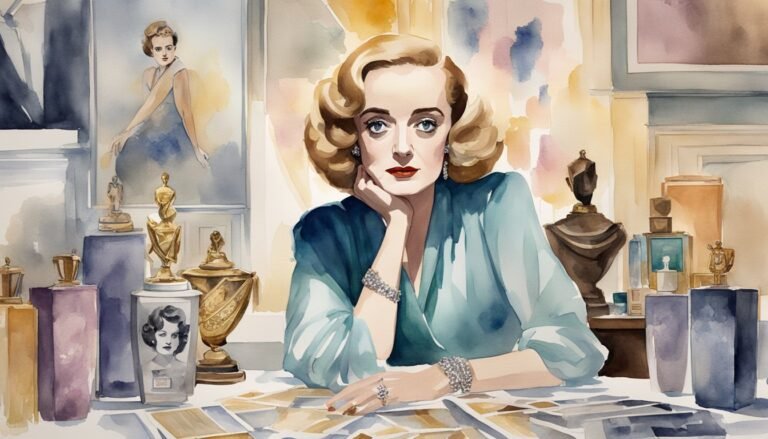
Ruth Elizabeth “Bette” Davis, born on April 5, 1908, in Lowell, Massachusetts, was an iconic American actress who transformed Hollywood. Her fierce intensity and groundbreaking roles earned her a place among the greatest actresses in cinematic history. Starting her acting journey on Broadway before making it big in film, Davis became a household name with her unparalleled talent and determination.
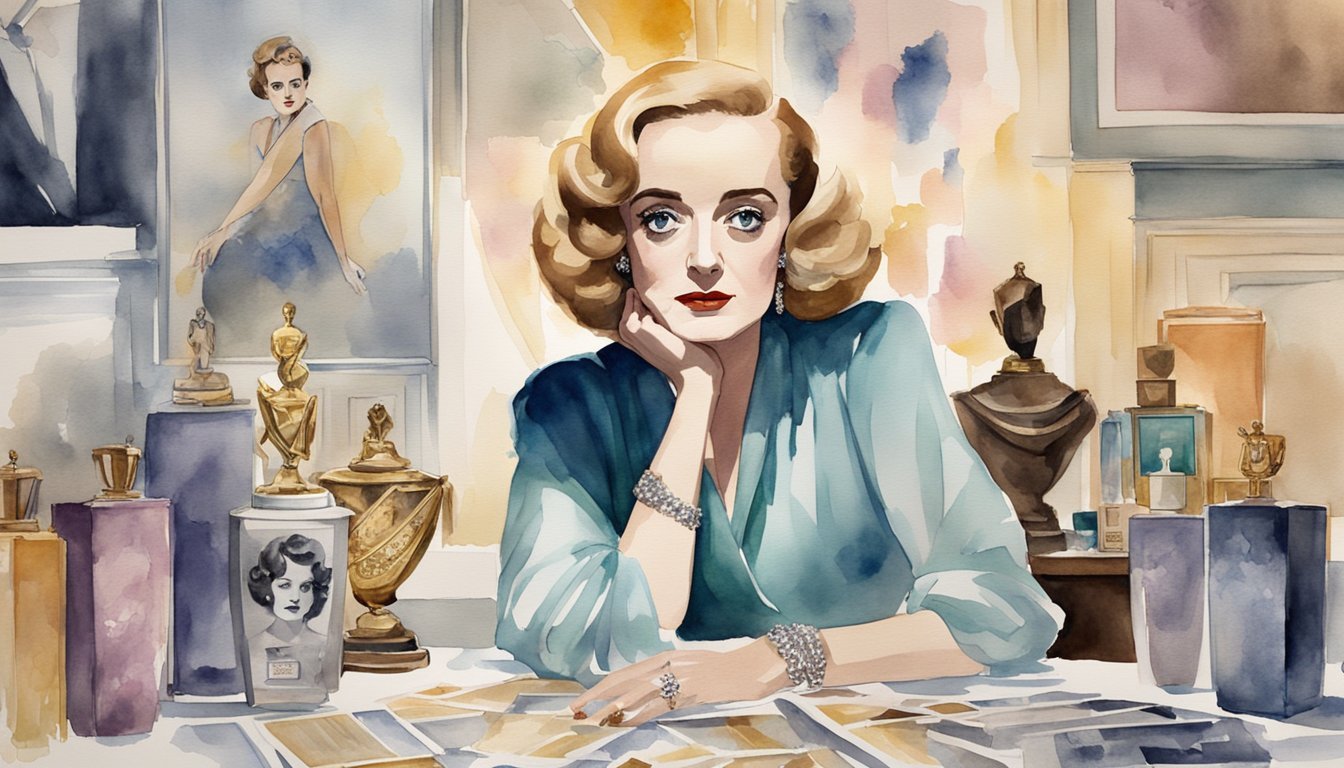
Bette’s career wasn’t just about her memorable performances.
She was known for her bold personality and willingness to fight for better roles and pay, paving the way for future actresses.
Her performances in movies like “All About Eve” and “Jezebel” set new standards in the industry.
Despite facing many personal and professional struggles, Bette’s resilience never wavered.
Beyond her film roles, Bette Davis also ventured into other areas such as television and theater later in her life, showcasing her versatility.
She left an indelible mark on Hollywood, not just through her work but also by inspiring generations of actors.
Explore the fascinating journey of a true legend and discover the secret spiritual knowledge that influenced stars like Davis by clicking here.
Key Takeaways
- Bette Davis was a pioneering American actress who reshaped Hollywood.
- She earned acclaim through intense performances and fought for better roles.
- Davis remained influential and versatile throughout her long career.
Early Life and Education
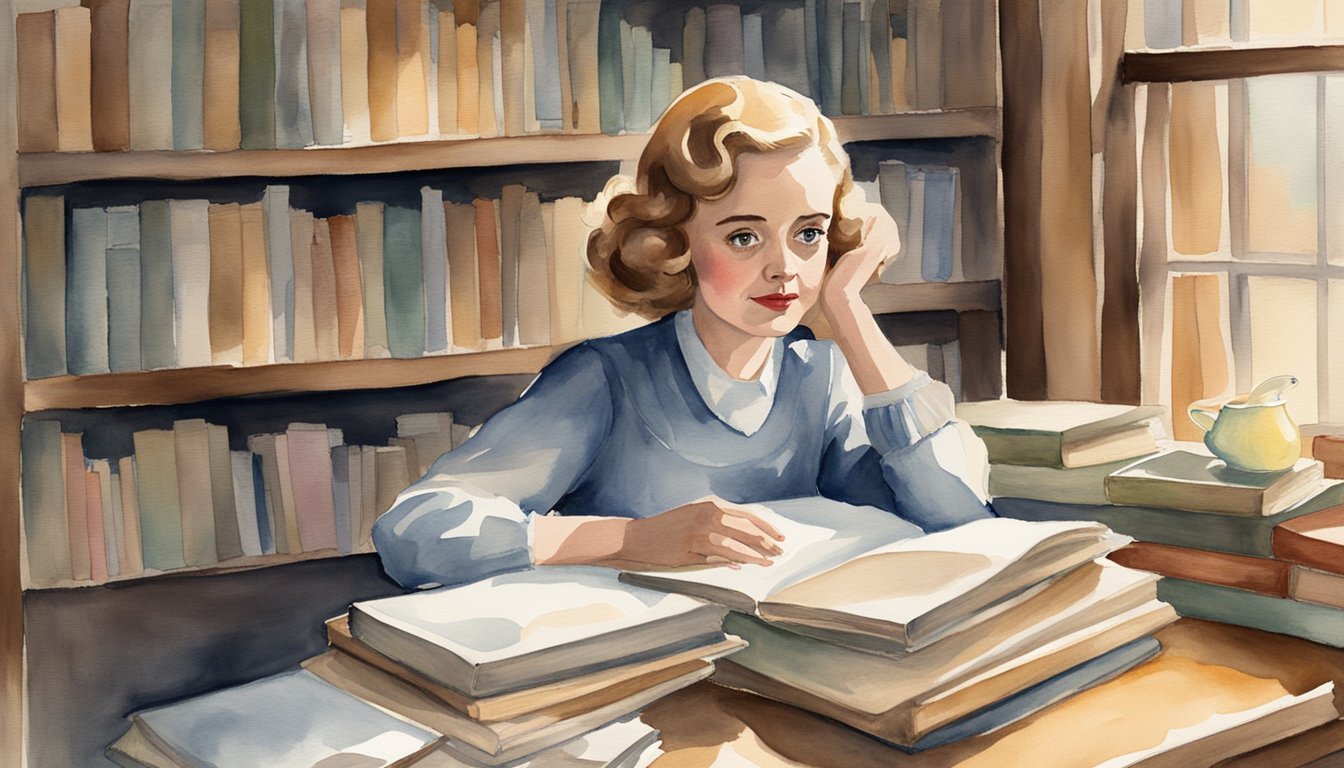
Bette Davis, known as Ruth Elizabeth Davis in her early years, had a unique journey from her childhood in Lowell, Massachusetts, to becoming a Broadway actress.
Her experiences at Cushing Academy shaped her path toward the theater.
Childhood in Lowell, Massachusetts
Bette Davis was born in Lowell, Massachusetts on April 5, 1908.
Her parents were Harlow Morrell Davis, a law student turned patent attorney, and Ruth Augusta Favor.
Growing up, she was affectionately called “Betty.”
Her parents divorced when she was ten years old, and she and her sister were raised by their mother.
This separation significantly impacted her childhood, grounding her in a strong, independent spirit.
Theatrical Beginnings at Cushing Academy
Bette attended her mother’s alma mater, Cushing Academy, in Massachusetts.
Here, she initially showed interest in dance, believing dancers led glamorous lives. 🌟 However, her fascination with the stage soon took precedence.
At Cushing, she developed a love for acting that defined her career.
The academy provided a supportive environment that nurtured her talents, encouraging her to pursue her dream of performing on the stage.
This passion eventually led her to another significant milestone in her career.
New York Broadway Debut
Bette’s journey took a significant turn when she made her way to New York for her Broadway debut.
She landed a role in “Broken Dishes” in 1929, marking her official entry into professional theater. 🎭
Her performance received positive reviews, establishing her as a bona fide Broadway actress.
This debut set the stage for her illustrious career in Hollywood, where she would become an icon. 🌟
For those curious about hidden spiritual insights, explore secret spiritual knowledge.
This remarkable accomplishment in New York was just the beginning of a long and storied career that saw her rise to stardom.
Rise to Stardom
Bette Davis’s journey to fame was marked by a series of critical milestones.
She began with a notable film role that led to her signing with Warner Brothers, eventually gaining recognition for her role in Of Human Bondage.
First Film Breakthrough
Bette Davis started her film career with a contract at Universal.
Initially, she was typecast in glamorous roles that didn’t fully showcase her talent.
Her big break came with the film The Man Who Played God in 1932.
This film allowed Davis to explore more complex characters, setting the stage for her upcoming success.
It was this performance that caught the eye of bigger studios and audiences.
Despite the early struggles, this role proved to be a turning point for her career. 🎬
Contract With Warner Brothers
After her success with The Man Who Played God, Bette Davis signed a long-term contract with Warner Brothers.
This was a significant move in her career, as Warner Brothers was one of the leading studios in Hollywood at the time.
She quickly became one of their most valuable stars.
Her bold and intense acting style resonated with audiences and critics alike.
This contract also provided her with more challenging and diverse roles, further proving her versatility as an actress.
Acclaim for ‘Of Human Bondage’
Davis’s role in Of Human Bondage (1934) was a game-changer.
Lent out to RKO, she played a complex and unsympathetic character named Mildred.
This performance earned her widespread critical acclaim and solidified her status as a serious actress. 🌟
Her portrayal was so compelling that it led to a write-in campaign for an Oscar nomination, despite not being officially nominated.
This film is often considered one of the high points of her career, showcasing her ability to dive deep into difficult roles.
Bette Davis’s star power and acting prowess were now undeniable.
To explore more about spiritual journeys, check out this resource.
Oscar-Winning Performances
Bette Davis won two Academy Awards for Best Actress in her career. 📽️ These awards reflected her exceptional talent and her ability to bring complex characters to life.
Critical Success in ‘Dangerous’
In 1935, Bette Davis received her first Academy Award for Best Actress for her role in Dangerous.
She portrayed Joyce Heath, a troubled actress whose personal and professional lives are in disarray.
Her performance was praised for its intensity and depth, showcasing her ability to embody flawed and fascinating characters.
This role established her as a significant talent in Hollywood and earned her widespread acclaim.
For more about her spiritual journey during this time, check out this interesting resource.
Further Acclaim in ‘Jezebel’
Bette Davis won her second Oscar for Best Actress in 1938 for her role in Jezebel.
She played Julie Marsden, a headstrong Southern belle with a rebellious spirit.
Her portrayal was powerful and multifaceted, capturing both the character’s charm and her destructive tendencies.
This performance further solidified Davis’s reputation as one of the leading actresses of her time.
Both roles demonstrated her versatility and her ability to take on complex, flawed characters, earning her lasting recognition in film history. 🍿
Iconic Film Roles
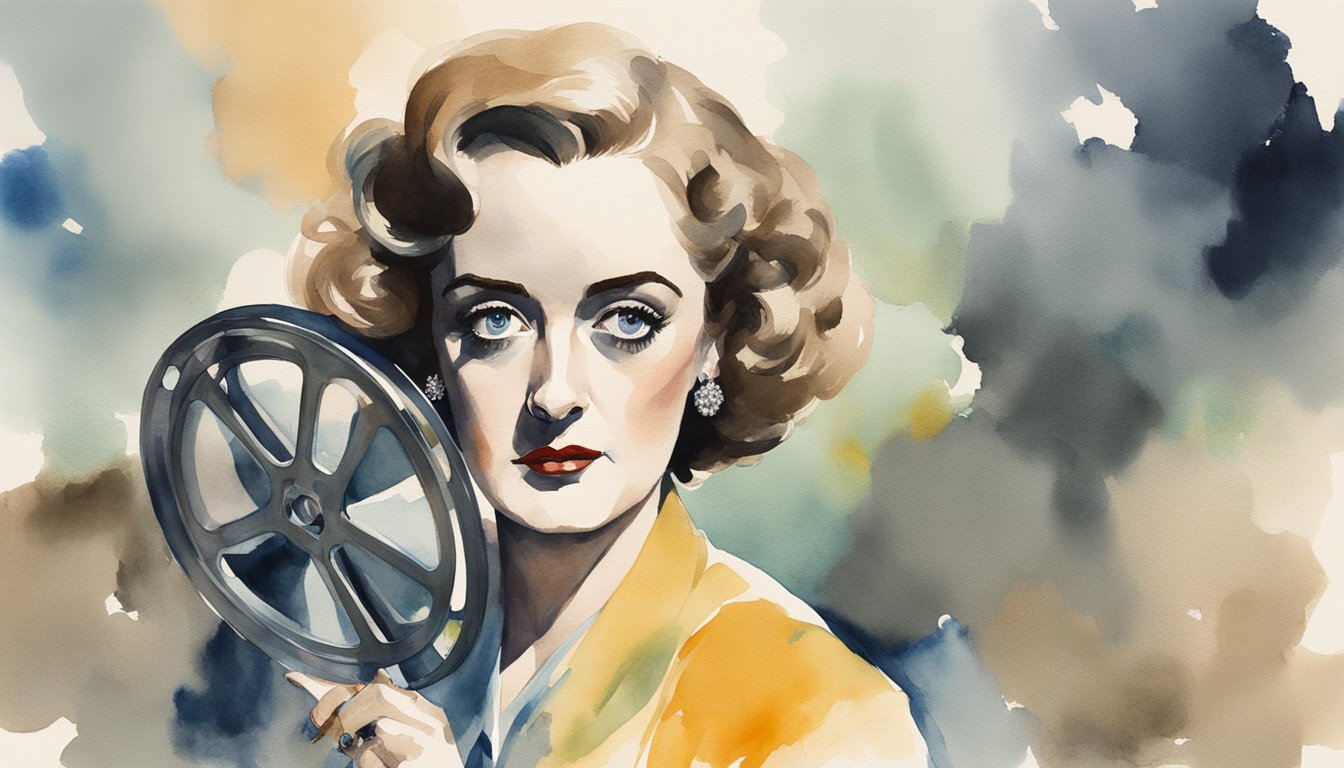
Bette Davis starred in numerous unforgettable films, making a lasting impact on Hollywood with her powerful performances.
Let’s look at some of her most iconic roles that showcase her incredible talent.
‘Dark Victory’ and ‘The Petrified Forest’
In “Dark Victory” (1939), Bette Davis played the role of Judith Traherne, a young, wealthy woman who faces a terminal illness with courage and vulnerability.
This performance earned her an Academy Award nomination and is considered one of her finest.
The film’s emotional depth and Davis’s talent made it a standout in her career. 🌟
In “The Petrified Forest” (1936), Davis co-starred with Leslie Howard and Humphrey Bogart.
She portrayed Gabrielle Maple, a waitress dreaming of escaping her small town.
This film was significant for solidifying Bogart’s status as a leading actor.
Davis’s chemistry with Howard and Bogart added layers to the narrative, making it a critical success.
‘Now, Voyager’ and ‘The Little Foxes’
“Now, Voyager” (1942) featured Bette Davis as Charlotte Vale, a repressed woman who undergoes a dramatic transformation.
This film is famous for its romantic storyline and Davis’s portrayal of growth and resilience.
The scene where Paul Henreid lights two cigarettes and passes one to Davis became iconic, symbolizing their connection. 🌿
In “The Little Foxes” (1941), Davis took on the role of Regina Giddens, a ruthless and ambitious Southern woman.
Her performance as Regina was chilling and compelling, showcasing her ability to portray complex, morally ambiguous characters.
The film was critically acclaimed and demonstrated Davis’s range as an actress, solidifying her place in cinema history. 👒
Discover the secret spiritual knowledge mentioned in these classic films.
Collaborations and Disputes
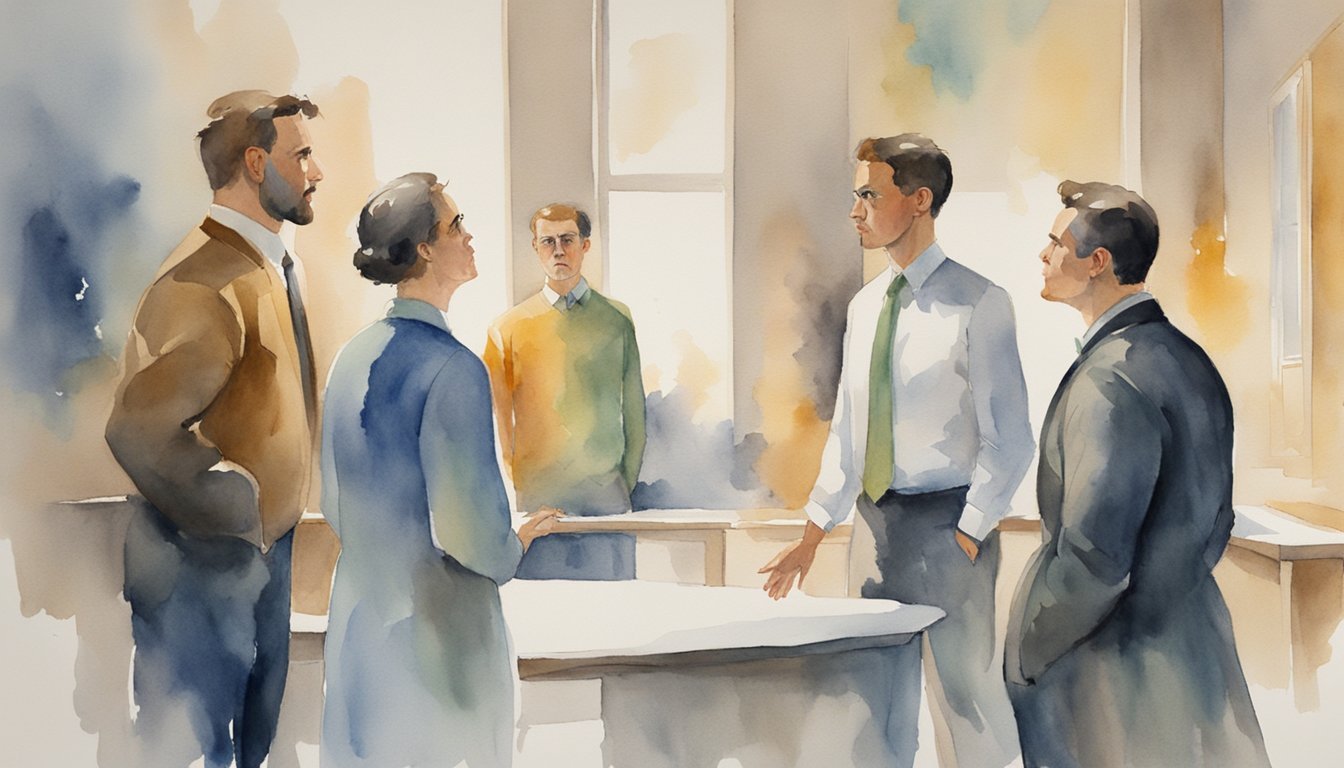
Bette Davis, known for her strong-willed personality, had several notable collaborations and highly publicized disputes in her career.
Among these, her work with director William Wyler and her infamous feud with Joan Crawford stand out.
Work Relationship with William Wyler
Bette Davis and William Wyler worked together on multiple films.
Davis starred in Jezebel (1938), which earned her an Oscar for Best Actress, thanks in part to Wyler’s expert direction. 🏆 Their partnership extended to The Letter (1940) and The Little Foxes (1941).
They had a tumultuous yet professional relationship, with Davis often clashing with Wyler over creative decisions but acknowledging his talent for getting the best out of her performances.
Their collaboration is remembered for producing critically acclaimed films that highlighted Davis’s acting prowess.
Infamous Feud with Joan Crawford
The rivalry between Bette Davis and Joan Crawford is legendary, becoming Hollywood folklore.
Their most notable clash occurred during the filming of What Ever Happened to Baby Jane? (1962).
The tension between them was palpable, as they often exchanged barbs and competed for on-screen dominance. 🎬 Davis felt Crawford stole the limelight, while Crawford believed Davis received undue praise.
Their animosity continued even off-set, with each taking opportunities to undermine the other in public.
Despite their feud, the film was a hit and highlighted their formidable acting skills.
The link here for secret spiritual knowledge can offer deeper insights into intense personal dynamics like theirs.
The drama between them added a layer of interest to their careers, making What Ever Happened to Baby Jane? a significant part of Hollywood history.
Personal Life and Marriages
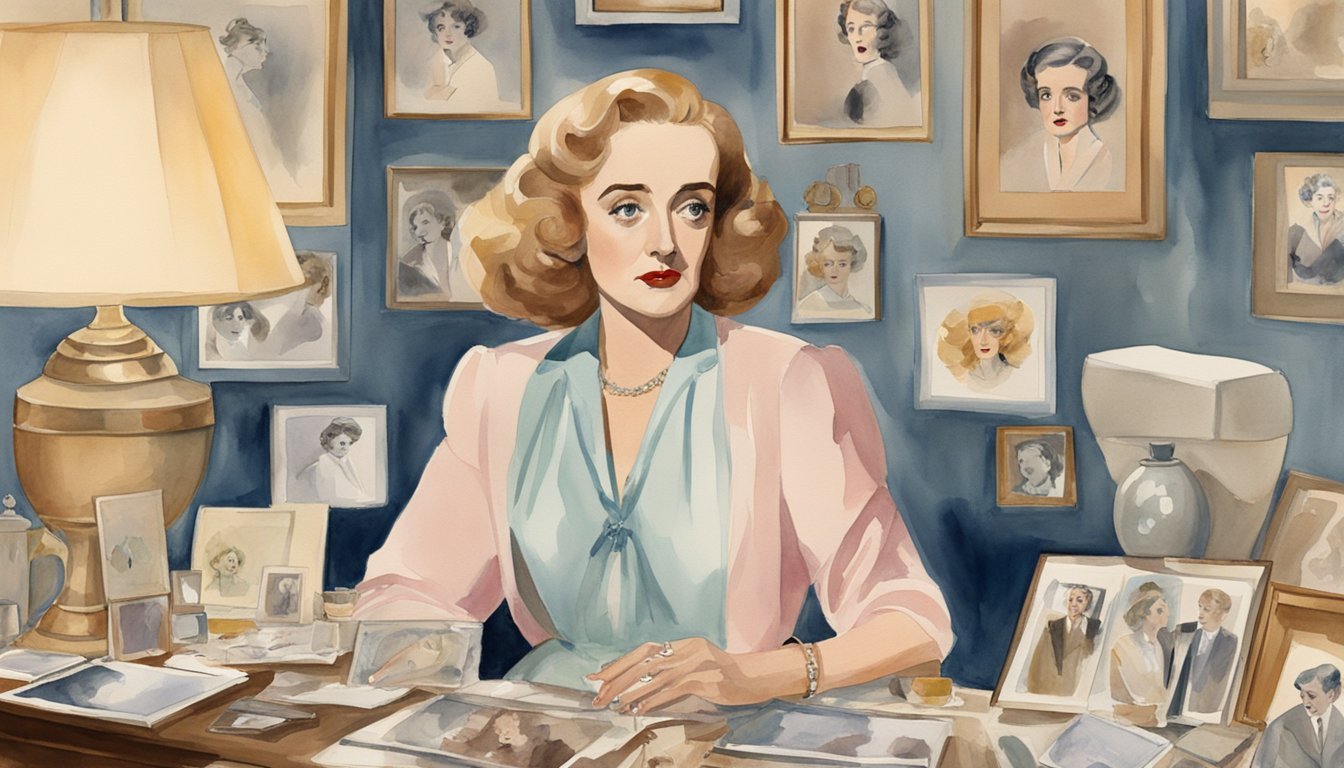
Bette Davis had a colorful personal life marked by multiple marriages and several intense relationships with her co-stars.
Her life off-screen was almost as dramatic as her on-screen performances.
Four Marriages and Motherhood
Bette Davis married four times in her life.
Her first husband was Harmon Nelson, followed by Arthur Farnsworth, who tragically died.
Her third marriage to William Grant Sherry lasted from 1945 to 1950.
With Sherry, she had a daughter named Barbara, also known as B.D. The marriage ended in divorce.
Her final marriage was to actor Gary Merrill.
This union lasted from 1950 to 1960.
They adopted two children: Margo and Michael.
Despite their strong initial bond, their relationship eventually fell apart due to Davis’s demanding career and Merrill’s struggles.
Relationships with Co-Stars
Davis also had notable relationships with some of her co-stars.
Her on-screen chemistry with actors like Humphrey Bogart and Henry Fonda often sparked rumors of off-screen romances.
However, not all of these relationships were romantic; some were deep friendships.
Despite these close bonds, Davis often clashed with her fellow actors due to her intense and passionate nature.
This intensity sometimes led to friction on set, but it also forged some of her most memorable performances.
For those interested in exploring more topics like this, here’s a fascinating link to secret spiritual knowledge.
Late Career and Recognition
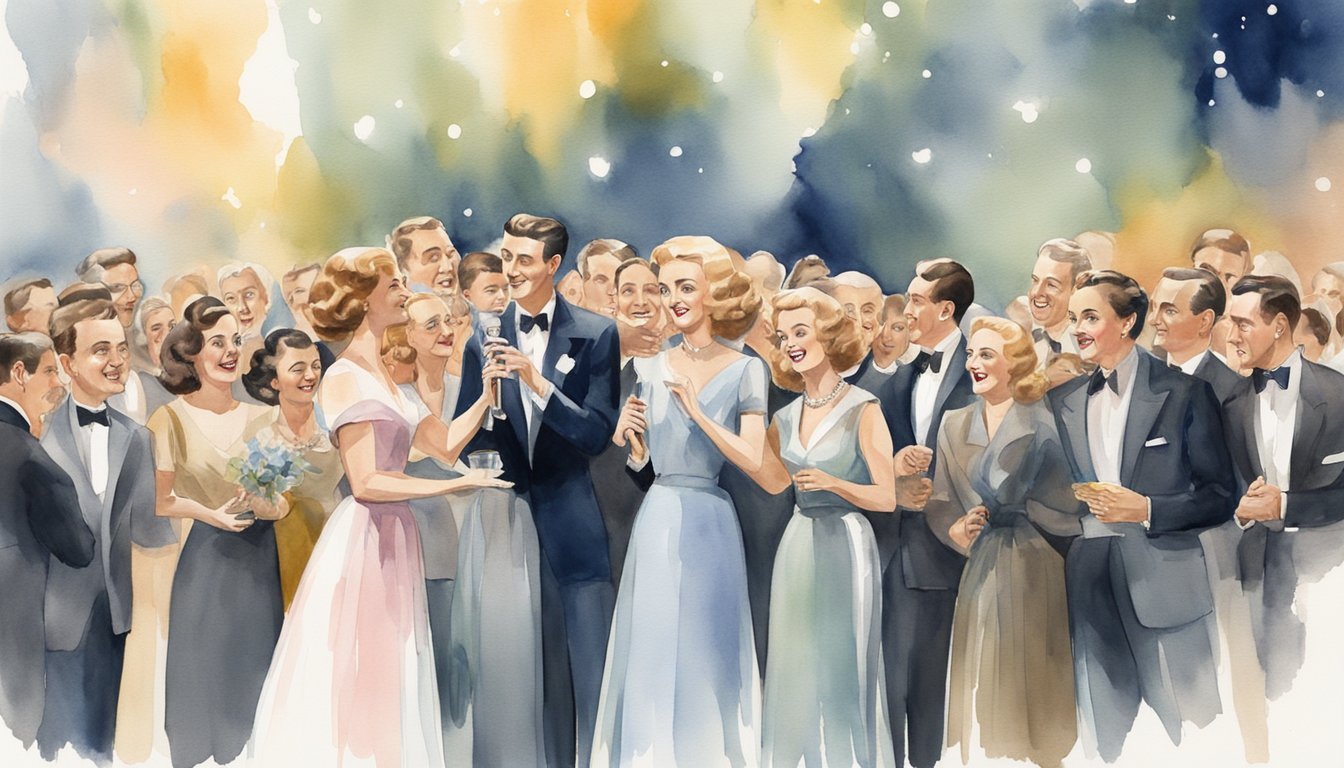
Bette Davis continued to demonstrate her talent in the later years of her career, earning significant awards and acting in notable films like “The Whales of August” and “The Anniversary.”
Prestigious Awards and Honors
Bette Davis received numerous honors throughout her career.
She was awarded the Lifetime Achievement Award 🌟 by the American Film Institute in 1977, recognizing her extensive contributions to the film industry.
Her performances were not only appreciated by audiences but also by critics and fellow actors.
She was honored with various awards, showcasing her enduring impact on cinema.
The Lifetime Achievement Award is one of the most prestigious honors in the film industry.
It celebrates individuals who have made exceptional contributions to the art of cinema, and Bette Davis’ receipt of this award speaks volumes about her significant influence and lasting legacy.
‘The Whales of August’ and ‘The Anniversary’
In “The Whales of August” (1987), Bette Davis played alongside Lillian Gish, portraying a touching story of two elderly sisters.
This film is often highlighted as one of her major works in later years, captivating audiences with its heartfelt narrative and strong performances.
“The Anniversary” (1968) is another notable film from her later career.
Davis played a domineering matriarch in this British black comedy, showcasing her ability to adapt to different genres and deliver memorable performances.
Both films stand out as proof of Davis’ versatility and enduring talent, even during the later stages of her acting career.
For secret spiritual knowledge related to influential figures like Bette Davis, you can explore more.
Off-Screen Ventures
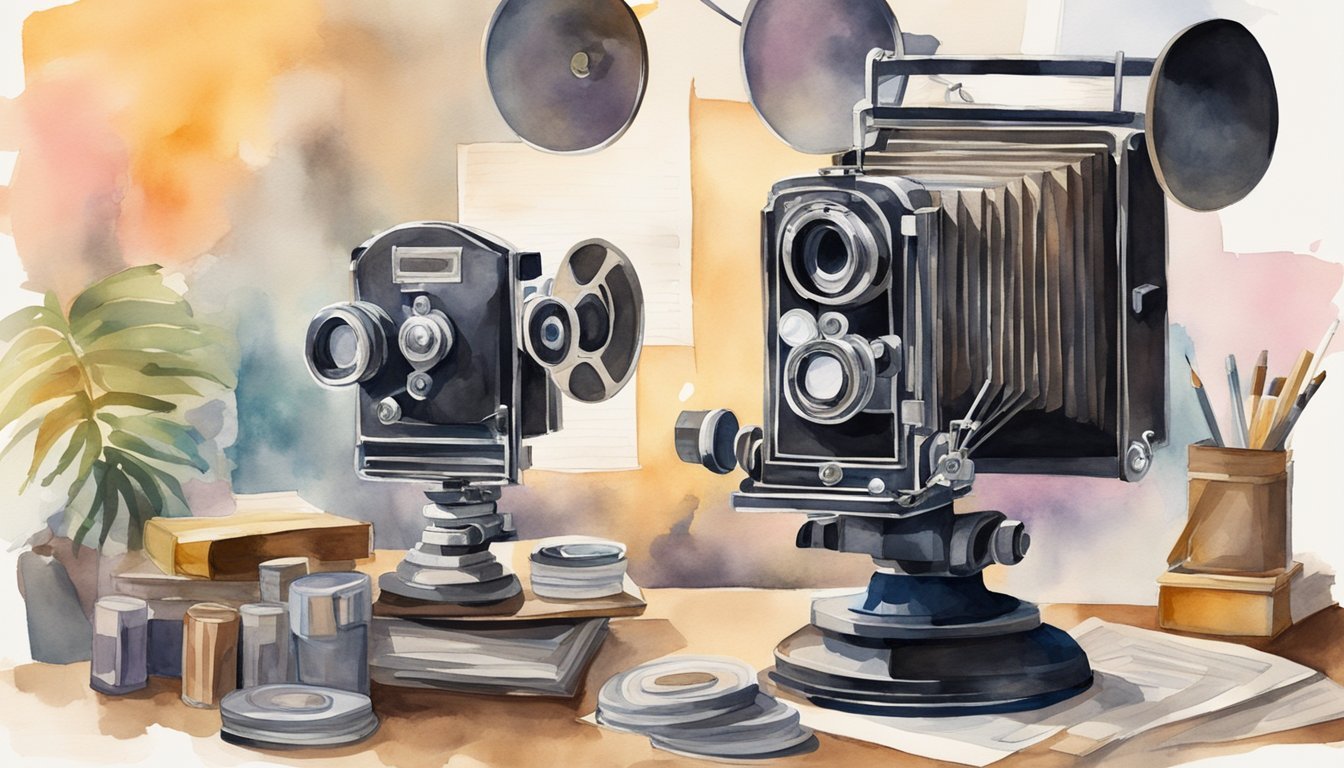
Bette Davis was not only a legendary actress but also made a significant impact outside of her film career through writing and charity work.
Publication of Memoirs
Bette Davis shared her experiences and insights through her memoirs, The Lonely Life and This ‘N That.
She didn’t hold back and gave fans a peek into her personal life and career struggles.
These books are filled with anecdotes about her rise to fame, her battles with studio executives, and her life behind the scenes.
In The Lonely Life, she talks about her early life and career challenges. 🍿
This ‘N That gives readers detailed accounts of her later years and her thoughts on the film industry.
These memoirs offer a comprehensive look at Davis’s life, both the glamorous and not-so-glamorous parts.
Philanthropic Efforts in Hollywood
Bette Davis was also known for her charitable works, especially her involvement with the Hollywood Canteen during World War II.
She co-founded the club, which provided free food, entertainment, and dancing for servicemen. 🪖
Her efforts helped boost the morale of soldiers and showed her dedication to supporting the troops.
She spent countless hours at the Canteen, alongside other Hollywood stars, ensuring that servicemen were well cared for.
Davis’s commitment to the Hollywood Canteen reflects her broader philanthropic spirit and her wish to give back to the community that had supported her.
For secret spiritual knowledge, check out this site.
Struggles and Resilience

Bette Davis faced many challenges in her career and personal life.
Despite these obstacles, she showed incredible strength and determination in overcoming them.
Legal Battles with Studios
Bette Davis had a fierce spirit 🦁, and that led her to clash with Warner Bros.
In the 1930s, she fought for better roles and higher pay.
Davis was not afraid to take legal action, even if it meant going to court.
She argued that the studio was not giving her roles that matched her potential.
This legal battle was risky.
She could have been blacklisted, but her courage paid off.
Eventually, Warner Bros. offered her better roles in movies like Jezebel and Dark Victory.
This was a win for not just Davis, but many other actors who followed.
Overcoming Health Challenges
Her personal life was also marked by health struggles.
Bette Davis was diagnosed with breast cancer and later suffered a stroke.
These medical issues didn’t stop her.
She continued to act in notable roles well into her later years.
Her fight against cancer showcased her never-give-up attitude. 💪
Even during her treatments, she remained active, showing her resilience.
This determination not only extended her career but also inspired many.
Her ability to push through pain and keep doing what she loved made her a true icon.
For those interested in exploring some of the lesser-known aspects of resilience and strength, you might find secret spiritual knowledge fascinating.
Click here to learn more.
Legacy and Influence
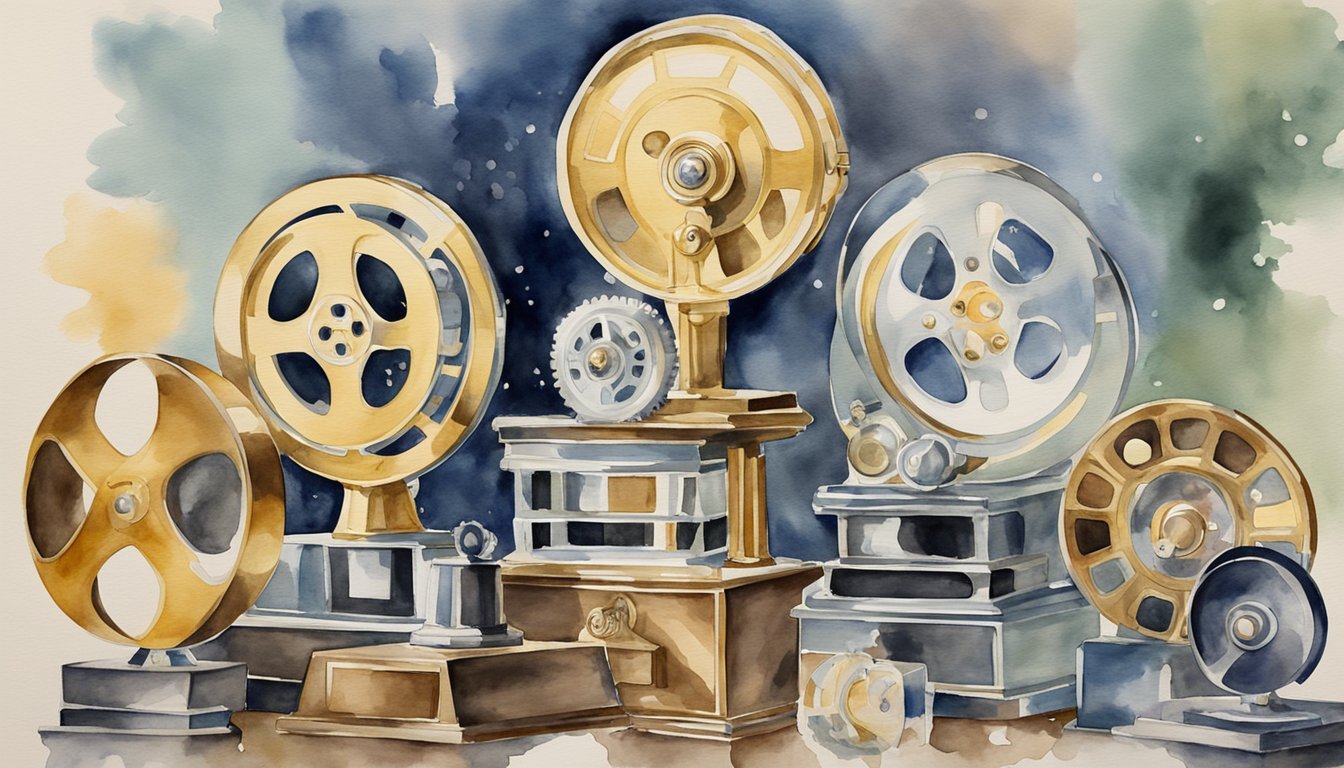
Bette Davis left a lasting mark on Hollywood and is still celebrated for her immense contributions to the film industry.
Her impact continues through modern films and numerous posthumous honors. ✨
Reverence in Modern Hollywood
Bette Davis remains an iconic actress whose work influences contemporary cinema.
Many modern actors and directors admire her dedication and groundbreaking performances.
Known for her intense roles, Davis challenged the norms of her time, pushing for stronger, more complex female characters.
Her film career, especially in classics like All About Eve and Jezebel, set a high bar for acting.
Directors still study her work to understand how to evoke powerful emotions on screen.
Bette’s fearless approach has made her a model for serious actors.
With a career that began in New England and blossomed in Hollywood, Davis’s influence is everywhere.
She was one of the first women to demand quality roles, paving the way for future generations.
Her spirit lives on in the strong, multifaceted characters seen in today’s films. 🎬
Posthumous Tributes and Awards
Since her passing, Bette Davis has received numerous accolades commemorating her contributions to cinema.
The American Film Institute named her the second greatest female star of classic Hollywood cinema, a testament to her enduring legacy.
Various film festivals and award ceremonies continue to honor her memory.
Special events celebrate her movies, while film schools include her work in their curriculum.
The Bette Davis Foundation, dedicated to her legacy, supports young actors in achieving their dreams.
In addition, secret spiritual knowledge hints at the depth of her legacy, influencing not just cinema but culture at large.
Museums and exhibitions often feature her costumes and memorabilia, keeping her contribution alive for new fans to appreciate. 🏆

